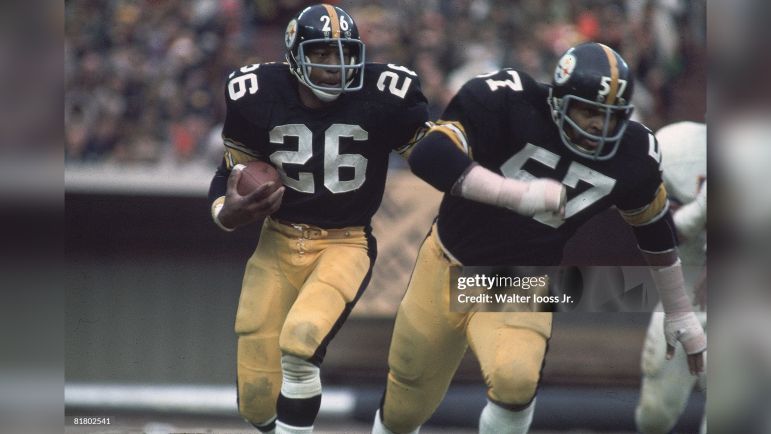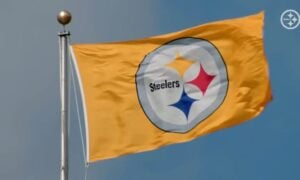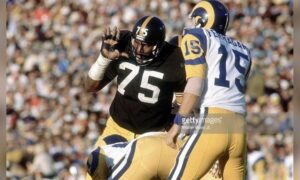The Pittsburgh Steelers’ 1970s dynasty is one of, if not the greatest in NFL history. From 1974-1979 Pittsburgh won four Super Bowls with a tight-knit group that was dominant on both sides of the ball. One of the reasons for the Steelers’ 1970s success was their 1974 draft class, which got extensive reps in the summer of 1974 due to the players strike that summer.
The ’74 draft class consisted of four future Hall of Famers in WR Lynn Swann, LB Jack Lambert, WR John Stallworth and C Mike Webster, and undrafted S Donnie Shell. Due to the strike, they got more reps with Swann, Stallworth, and Lambert all impressing head coach Chuck Noll enough to carve out key roles on that ’74 team.
According to former Steelers player representative RB Preston Pearson, Noll was not happy with what he was organizing.
“I happened to be the Steelers’ player representative, so Chuck Noll and I kinda butted heads quite a bit during that time frame,” said Pearson during an interview with Cowboys Cave on YouTube. “In fact, Chuck Noll, and I’m not trying to throw shade on a guy who’s not here but I’m just telling you the truth, ok? The guy called me into his office and he basically said ‘What are you doing.’ This is not a quote, but he basically said to me, as he pointed his finger at me and said, ‘What are you doing to my team?'”
One of the biggest goals of the 1974 players’ strike revolved around free agency. Although that was not secured in 1974, the players were able to get better pensions, better medical and dental benefits, and more money in their salaries.
Despite these noble goals, Pearson said he never really had support from his fellow teammates.
“I just happened to be the spokesman,” said Pearson. “We had guys like Joe Greene, and Terry Bradshaw, and L.C. Greenwood, and Ernie Holmes, and Lynn Swann, and all these superstars who gone on to get in the Hall of Fame. And to be honest with you guys, those guys did not support me! They didn’t support me, otherwise Chuck Noll probably wouldn’t have been as tough on me.”
Swann, being a rookie, was not part of the strike, but the rest of the players Pearson mentioned all took part in it. We can do nothing but take Pearson’s word, so it seems that a lot of the Steelers’ superstar players’ hearts were not truly in the strike or Pearson wanted to strike longer than the rest of the team. The players’ strike across the NFL came to an end on Aug. 10, enough time for teams to get their veterans back and prepare for the season even if that prep time got slashed in half.
However, according to the Pittsburgh Post-Gazette, Steelers players were crossing the lines from at least July 29. Once the NFLPA called for a “cooling-off” period, the big names began to break the strike lines, with the Post-Gazette writing that players like Greene, Jack Ham, Mel Blount, and Franco Harris among others reported to training camp. Although many big names left the lines, there were still some remaining. While we cannot confirm, it seems like Pearson was one of the last ones to report to camp.
Pittsburgh’s 1974 rookie class greatly benefited from the extra reps. Swann and Stallworth combined for 27 catches for 477 yards and three touchdowns. Nowadays that would be extremely pedestrian, but in the 1974 season Pittsburgh had a quarterback carousel, with Bradshaw, Joe Gilliam, and Terry Hanratty all playing, and were also run heavy. RB Franco Harris, who was on the picket line, had 208 rushing attempts in 12 games.
Pearson was cut from the Steelers following the 1974 season and although Pearson may argue it was due to the strike, the emergence of RB Rocky Bleier may have made Pearson expendable. Pearson missed the last five games of the 1974 regular season due to a hamstring injury while Bleier had his best season to date with 88 carries for 373 yards and two touchdowns. We may never know the real reason Pearson was let go after the 1974 season but from Pearson’s recollection of the strike and Noll’s alleged reaction it is understandable that he feels his role as NFLPA representative played a part in it.
You can argue the 1974 strike worked out great for the Steelers. They developed their rookies and got their superstars back in time for the regular season as they pushed for the Super Bowl and began an incredible run that spanned the rest of the decade.








